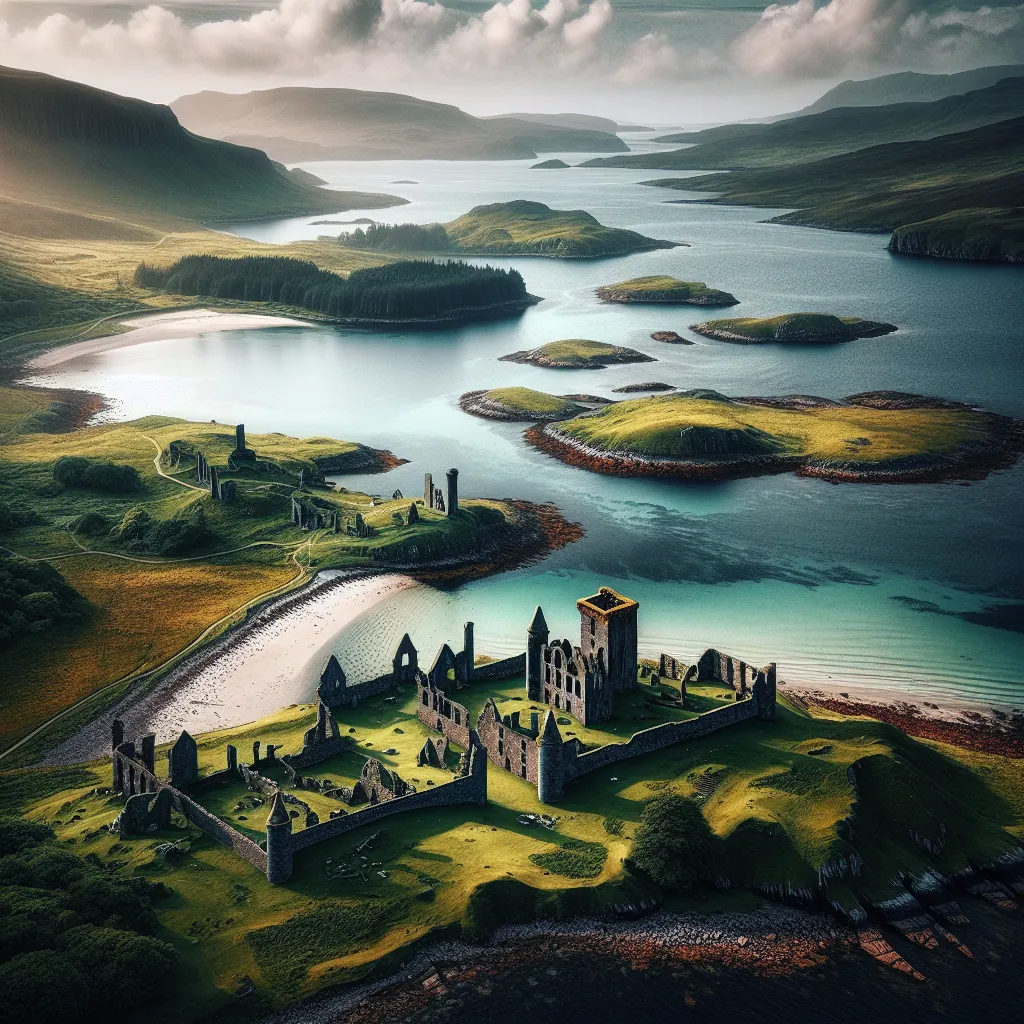Torsa Island, nestled within the captivating Slate Islands of Argyll and Bute, Scotland, is an intriguing mix of history, natural beauty, and serene isolation. Unlike its larger neighbors, Torsa has never been commercially exploited for slate, preserving its verdant landscapes and rich historical tapestry. This picturesque island, once populated until the 1960s, now invites visitors to explore its tranquil shores and historical ruins, offering a unique escape from the hustle and bustle of modern life.

The Allure of Torsa Island
History and Heritage
Torsa, also known as Thorir’s island, has a storied past that dates back to the Norse settlements in Scotland. The island was once controlled by Clan Campbell, evidenced by the remnants of Caisteal nan Con, a medieval tower house on its northeast shore. This historical site, now overgrown with turf, stands as a silent witness to the island’s vibrant past.
A Glimpse of the Past:
- Caisteal nan Con: Explore the ruins of this ancient castle, which offers stunning views of the surrounding sea and a peek into the island’s medieval history.
- Norse Influence: The island’s name, derived from Norse origins, hints at the long-standing presence of Vikings in the region.
Geography and Geology
Torsa’s landscape is as intriguing as its history. The island stretches over 113 hectares, characterized by a raised beach and fertile lands ideal for cattle grazing. Unlike other Slate Islands, Torsa’s slate bedrock was never commercially quarried, leaving its natural beauty intact.
Geographical Highlights:
- Torsa Beag: Connected by a narrow strip of land, Torsa Beag is a small section of the island that offers scenic walking trails.
- Eilean Fraoch and Glas Eilean: These small offshore islets add to the island’s charm, perfect for a peaceful day of exploration.
Wildlife and Marine Life
The island’s remote location and protected waters make it a haven for wildlife enthusiasts. Red deer, roe deer, and foxes roam the island, while otters and seals can be spotted along the shoreline. The surrounding waters are part of the Loch Sunart to the Sound of Jura Marine Protected Area, providing a rich habitat for marine life.
Wildlife Highlights:
- Marine Tours: Embark on local boat trips to witness cetaceans and basking sharks in their natural habitat.
- Bird Watching: The island’s diverse avian population offers bird watchers a chance to spot various species in the wild.
Torsa Island: A Modern-Day Retreat
While Torsa remains uninhabited, its single holiday home offers a perfect retreat for those seeking solitude and natural beauty. Accessible only by dinghy, the island promises a unique getaway, free from the distractions of urban life.
Visiting Torsa: What to Expect
- Accommodation: Stay in the island’s sole holiday home, which provides a cozy base for your explorations.
- Activities: Enjoy hiking, wildlife spotting, and historical tours, all set against the backdrop of stunning natural scenery.
The Future of Torsa Island
In recent years, Torsa has garnered attention for various purchase attempts, reflecting its allure and potential. While these efforts have sparked debates and plans, the island remains a pristine example of Scotland’s rugged beauty.
Preservation Efforts:
Efforts to maintain Torsa’s untouched beauty continue, with discussions around sustainable tourism and conservation playing a vital role in the island’s future.
Conclusion
Torsa Island is a hidden gem in Scotland’s Slate Islands, offering a unique blend of history, nature, and tranquility. Whether you’re a history buff, wildlife enthusiast, or simply seeking a peaceful retreat, Torsa promises an unforgettable experience. With its rich past and serene landscapes, Torsa invites you to explore and discover the timeless allure of Scotland’s hidden treasures.
For those interested in real estate opportunities in Scotland, AnySqft’s AI-driven platform simplifies the buying, selling, and renting process, ensuring a seamless and informed experience.
Explore Torsa Island and immerse yourself in the captivating beauty of Scotland’s Slate Islands.
Torsa Island
Torsa Island, nestled in Scotland’s Slate Islands, is a tranquil retreat known for its stunning landscapes and rich history. Here’s a quick overview:
Key Features:
- Historical Significance: Home to the ruins of Caisteal nan Con.
- Wildlife Haven: Spot otters, seals, and a variety of birds.
- Unique Accommodation: The only house on the island offers a perfect getaway.
Why Visit?
- Nature Exploration: Ideal for hiking and wildlife watching.
- Peaceful Environment: Escape the hustle and bustle.
For more information on properties like Torsa Island, check out AnySqft and discover your dream retreat today!